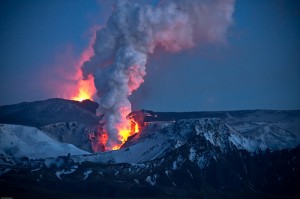Iceland closed main airport after a volcano eruption
Iceland closed its main international airport on Sunday after a volcano eruption that sent a plume of ash and smoke high into the air.
Iceland’s airport and air traffic control operator Isavia said that Keflavik airport was closed to all inbound and outbound traffic at 8:30 a.m. local time.
“The ash is covering all of Iceland” – Isavia spokeswoman Hjordis Gudmundsdottir said.
The Grimsvotn volcano in Iceland’s most active Vatnajokull glacier started to erupt in the late hours of Saturday.
The volcano showed clear signs of ‘volcanic unrest’ at around 18:00 GMT on Saturday, with Icelandic media quoting geologist Hjorleifur Sveinbjornsson as saying the eruption was imminent. Plumes of ash and smoke were seen rising from the crater an hour later. The volcanic cloud reached the height of 20,000 meters.
The eruption on the Eyjafjallajokull Glacier in Iceland, which began on April 14, 2010, paralyzed air traffic throughout central and northern Europe, leaving thousands of travelers stranded and forcing more than 20 European countries to close their airspace.
The Vatnajokull area is the most active volcano location in Iceland. Since records began in 1920, it has erupted nine times, the previous eruption recorded in 2004. Most of them lasted at least one week, but the 2004 eruption took only four days.
Reykjavik – The eruption of Iceland’s most active volcano is unlikely to cause a repeat of last year’s major disruption to air traffic, an expert said, despite the island having to shut its main airport and maybe closing its airspace.
The Grimsvotn volcano burst into life on Saturday in what experts said was a stronger eruption than its last outbreak in 2004. The plume from the volcano shot 20 km/12 miles into the sky, forming a huge, bubbling mass which seeped above the clouds high over the North Atlantic island.
Experts have said it will probably not cause the same kind of disruption as when Eyjafjallajokull erupted last April, grounding European airlines for days, as its eruptions tend to be smaller and the particles from it less likely to disperse so far into the atmosphere.
Authorities halted flights then due to fears that dust and ash would get into aircraft engines and cause accidents after the cloud was blown into European air traffic lanes.
“There is no reason to expect Grimsvotn’s current eruption to produce the volume of finely fragmented ash that caused such disruption during last year’s Eyjafjallajokull eruption” – said Open University Volcano Dynamics Group expert David Rothery.
“There will be re-routing of some transatlantic flights, but I doubt that it will become necessary to close European airspace. The eruption is also expected to cause local flooding because of escape of meltwater” – he said.
Europe’s air traffic control organisation said on Sunday: “There is currently no impact on European or transatlantic flights and the situation is expected to remain so for the next 24 hours.
“Aircraft operators are constantly being kept informed of the evolving situation” – the Brussels-based organisation said.
Paris — Iceland’s most active volcano began erupting over the weekend, sending billows of ash up to 11 miles into the air on Sunday, and prompting the island nation to close its main international airport to commercial air traffic as a precaution, aviation officials said.
The Icelandic authorities said that as of 8:30 a.m. local time, Reykjavík-Keflavik International Airport was closed to all inbound and outbound air traffic.
“The ash is covering up all of Iceland” – said Hjordís Gudmundsdottir, a spokeswoman for Isavia, Iceland’s air navigation services provider. “We are trying to identify some holes in it and to use them to allow some flights, but it’s not looking very good right now.”
Overnight, Iceland’s civil protection agency said it had imposed a no-fly zone of 120 nautical miles around the Grimsvötn volcano in southeast Iceland.
Meteorologists said the prevailing winds were expected to blow the volcanic ash in a generally westward direction through the rest of this week — most likely avoiding a repeat of the widespread shutdowns of European airports that grounded more than 100,000 flights in April and May 2010.
Eurocontrol, the Brussels-based agency that coordinates air traffic management across the region, said it was monitoring the situation but it appeared there would be no wider threat to trans-Atlantic or European air travel at least for the next 24 hours.
